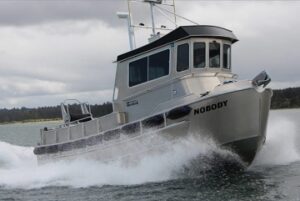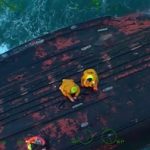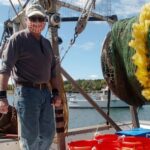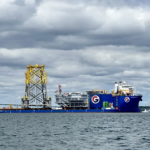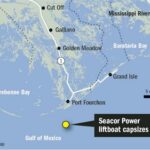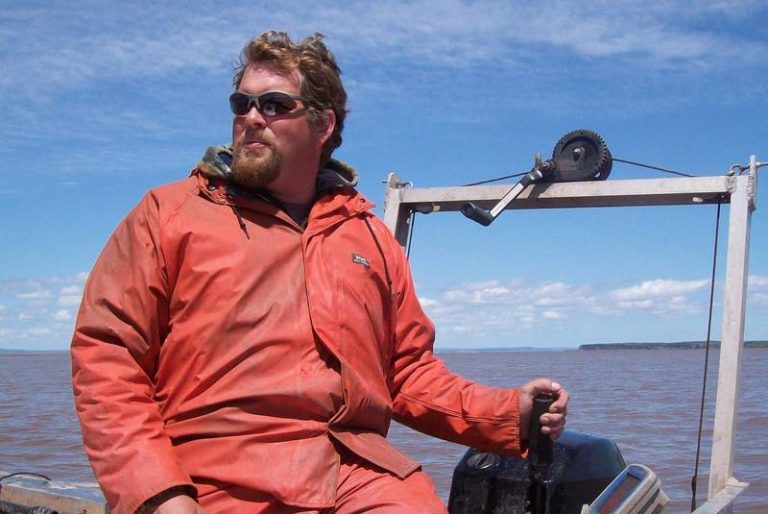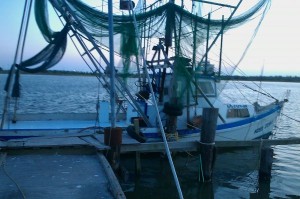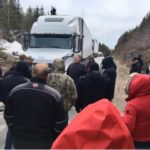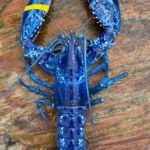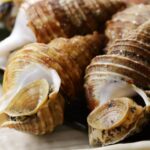Tag Archives: Seattle
Commercial fishing industry member Wallace L. “Buck” Huff of Seattle, Washington has passed away
 Wallace L. “Buck” Huff was born June 24, 1938, in Seattle Washington, to Wallace T. and Myrtabelle Huff. On March 24, 1967 Buck was united in marriage to Dolores A. Beste, and became the Dad to her 4 children and welcomed his youngest son a year later. The family lived briefly in Federal Way until moving to Westport WA in the early 70’s, where he worked most his life connected to the commercial fishing industry. He ran a boat lift at the Westport docks for Bar View Resort, owned and ran the Channel Cat and Ocean Knight, primarily fishing salmon, later he operated the Washington Crab Producers meal plant, until he retired in the mid-90’s. He moved to Moses Lake Washington in 2005 to be near his youngest son and his family and took a job at the Senior Center Thrift Store. more, >>CLICK TO READ<< 11:14
Wallace L. “Buck” Huff was born June 24, 1938, in Seattle Washington, to Wallace T. and Myrtabelle Huff. On March 24, 1967 Buck was united in marriage to Dolores A. Beste, and became the Dad to her 4 children and welcomed his youngest son a year later. The family lived briefly in Federal Way until moving to Westport WA in the early 70’s, where he worked most his life connected to the commercial fishing industry. He ran a boat lift at the Westport docks for Bar View Resort, owned and ran the Channel Cat and Ocean Knight, primarily fishing salmon, later he operated the Washington Crab Producers meal plant, until he retired in the mid-90’s. He moved to Moses Lake Washington in 2005 to be near his youngest son and his family and took a job at the Senior Center Thrift Store. more, >>CLICK TO READ<< 11:14
Fishing boat rams pier, several boats near Seattle’s Ballard Bridge
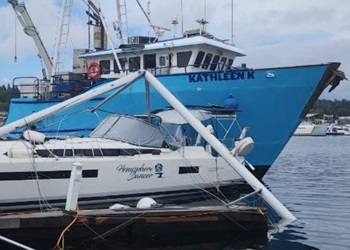 Crews responded to the west end of the Ballard Bridge after a fishing vessel crashed into a pier and several other boats Wednesday afternoon. According to the United States Coast Guard (USCG), at around 10:30 a.m., a 73-foot fishing boat crashed into the pier, damaging several other moored vessels. At around 12:28 p.m., the United States Coast Guard (USCG) announced that pollution teams were at the scene, reducing any potential environmental impacts. 4 photos, more, >>CLICK TO READ<< 20:41
Crews responded to the west end of the Ballard Bridge after a fishing vessel crashed into a pier and several other boats Wednesday afternoon. According to the United States Coast Guard (USCG), at around 10:30 a.m., a 73-foot fishing boat crashed into the pier, damaging several other moored vessels. At around 12:28 p.m., the United States Coast Guard (USCG) announced that pollution teams were at the scene, reducing any potential environmental impacts. 4 photos, more, >>CLICK TO READ<< 20:41
The St. Jude Is One of Seattle’s Last Commercial Tuna Boats
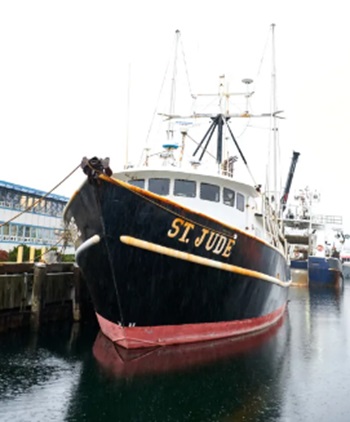 It’s a Monday afternoon and Fishermen’s Terminal in Ballard is relatively empty. A man pulls into the parking lot in a minivan and snakes his way over speed bumps to the water’s edge, where he stops alongside a battered-looking boat. After hopping onto the deck and exchanging a few words and some cash with the boat’s all-Fijian crew, he gingerly packs a whole flash-frozen albacore tuna into a Styrofoam container, places it in his trunk, and glides away. The transaction has the air of a secret. But it isn’t one. The St. Jude has been trolling for albacore in the Pacific for 35 years, and its owners, Joe and Joyce Malley, have been selling their catch off the boat intermittently since 1999. Photos, more, >>click to read<< 09:52
It’s a Monday afternoon and Fishermen’s Terminal in Ballard is relatively empty. A man pulls into the parking lot in a minivan and snakes his way over speed bumps to the water’s edge, where he stops alongside a battered-looking boat. After hopping onto the deck and exchanging a few words and some cash with the boat’s all-Fijian crew, he gingerly packs a whole flash-frozen albacore tuna into a Styrofoam container, places it in his trunk, and glides away. The transaction has the air of a secret. But it isn’t one. The St. Jude has been trolling for albacore in the Pacific for 35 years, and its owners, Joe and Joyce Malley, have been selling their catch off the boat intermittently since 1999. Photos, more, >>click to read<< 09:52
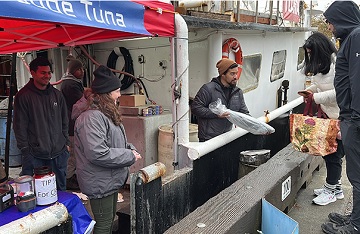
Part II: F/V St. Jude – A Taste for Tuna
Joe Malley has reeled in a lot of different fish in his over 40-year commercial fishing career, but tuna has a special place in his heart. And on his plate. “When I’m fishing halibut, the last thing I want to see on my plate is halibut,” he said. “If I’m fishing salmon, I don’t want even a beautiful King salmon. But when I’m fishing tuna, you can serve it to me all day, every day.” Tuna doesn’t have a big statement to make, Malley said. “It’s the perfect American fish – odorless, colorless, and tasteless. And tuna can be incorporated into dishes in so many ways; for instance, you can stir fry it just like chicken. ”For Malley, his wife Joyce, and their five-person crew, tuna is a way of life. The F/V St. Jude crew spends 12 months a year on a quest for albacore tuna — from the North Pacific in summer to the South Pacific in fall. >click to read< 12:37
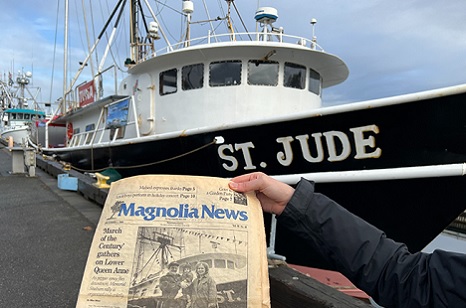
The Adventure of an Unconventional Career
Joe Malley keeps a faded but well-loved copy of the December 1, 1999 edition of the Magnolia News as a reminder of his family’s commercial fishing journey over the last two-plus decades. The photo and headline above the fold features Malley, his wife Joyce, and their young son Liam (now 24) standing in front of their new (at the time) fishing vessel, moored at the Port of Seattle’s Fishermen’s Terminal, as they prepared to embark on a new journey. The St. Jude, a 95-foot-troller, still makes its home at Fishermen’s Terminal today. Some things haven’t changed in the 23 years since the Magnolia News article was written. The St. Jude crew still fishes 12 months a year, chasing Albacore tuna from the North Pacific in summer to the South Pacific in fall. In between journeys they sell their catch off the St. Jude at Fishermen’s Terminal. >Photos, Video, click to read< 09:17
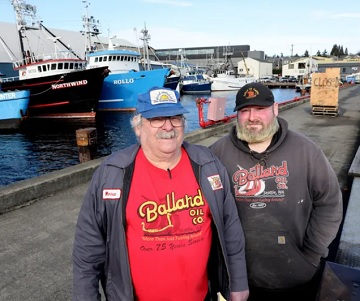
Ballard Oil closes after 85 years in Seattle, where oil and water no longer mix
Since 1937, Ballard Oil had been a fixture on the Lake Washington Ship Canal just east of the locks, providing fuel, lubricants and a few parts to Seattle’s commercial fishing boats, tugs and other vessels. Warren Aakervik Jr., 79, the second of four generations to run the company, cites a long list of reasons for the closure. Among them, costly regulations, rising taxes, a shortage of workers, a dwindling customer base and, most famously, the possibility that the city of Seattle might run the Burke-Gilman Trail though Aakervik’s industrial backyard. “It’s death by a thousand cuts,” says Aakervik as he stands with his grandson, Brandon Millard, on the company’s now-deserted fueling dock. “You keep on, keep on, keep on — and then finally, you just say, ‘Why am I beating my head against the wall?’” >click to read< 09:12
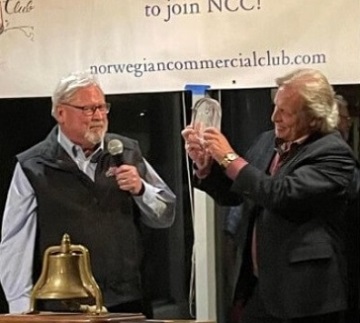
Doug Dixon, Pacific Fishermen Shipyard, Receives King Neptune Award
To recognize his life-long contribution to the North Pacific Fishing Industry and his countless hours of community service, the Norwegian Commercial Club (NCC) presented John Douglas Dixon, Pacific Fishermen Shipyard, with its highest honor, the King Neptune Award, during the 70th Annual Fishermen’s Night in December. In 1977, when the king crab biomass and value rose dramatically, Dixon headed north to MARCO Shipyard to Seattle to design and build crab boats. He was able to guide fishermen on what they wanted in their new boats. Mr. Dixon worked with Norwegian-American fishing pioneers of the day, including highliners and their vessels like the F/V NORTHWESTERN of Deadliest Catch fame, together with sales of the multitude of different types of hydraulic machinery MARCO invented. >click to read< 13:04
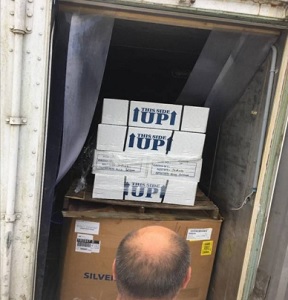
Lummi Nation member sold illegally taken Columbia River salmon
A member of the Lummi Nation and former owner of a wholesale fish processor was sentenced Wednesday, Dec. 14, in U.S. District Court to three years of probation for violating the Lacey Act by selling illegally caught Columbia River salmon. Scott Kinley knew the spring Chinook Columbia fishery was only open to Yakama Nation enrollees who were limited to fishing for subsistence and ceremonial purposes, according to a news release from the U.S. Attorney’s Office. From 2013 to 2019 Kinley operated Native American Fisheries, Inc., a seafood processing plant registered with the American Indian Food Program that was administered by the Intertribal Agricultural Council and funded through the USDA Foreign Agricultural Service. >click to read< 12:31
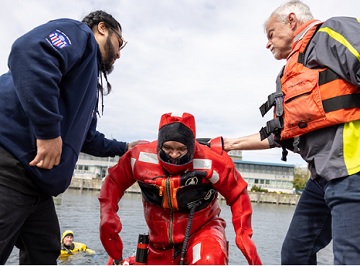
Safe Fishing Starts with Practice and Prep
The fishing season is currently underway for the North Pacific Fleet based out of Fishermen’s Terminal. From mid-June to September the fleet will fish the waters off the coast of Alaska for salmon, halibut, black cod, and other species. The fishers spent most of May and early June preparing their boats, provisioning, mending nets, and brushing up on safety best practices. The Seattle-based Fishermen’s Memorial organization aims to prevent accidental fisher deaths. Each year the organization honors local fishers who lost their lives at sea by adding their names to the Fishermen’s Memorial monument at Fishermen’s Terminal. Their ultimate goal is to stop adding names. Below are some of the safety demonstrations and exercises that were available to fishers at this year’s event. photos, >click to read< 07:54

Tullus Gordon remembered for contributions to fishing and construction industries
Tullus Gordon, a longtime Seattle-area general contractor, died Dec. 29 at the age of 95. A celebration of his life will be held next month in Ballard. Gordon operated Tullus Gordon Construction for 40 years. After WWII, he joined his brother in the commercial fishing industry. During this time, from 1947 to 1956, he fished up and down the West Coast, from Alaska to California. He later developed the power warping crab block, which helped revolutionize the fishing industry, according to his son. Todd said his dad transitioned from fishing to construction after Tullus was swept overboard while fishing in a storm off the Oregon coast and nearly died. That’s when Tullus’ first wife, Millie Vermillion, gave him the ultimatum “It’s either fishing or family,” according to Todd. >click to read< 18:26
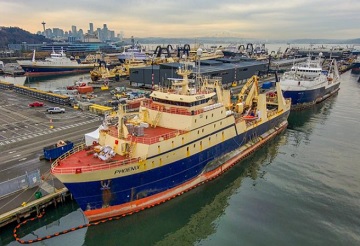
All About the Fishing Fleet at Terminal 91
The factory trawlers, or fish processing vessels, of the North Pacific Fishing Fleet are back in Seattle after four months of harvesting pollock in the Bering Sea and Gulf of Alaska. The docks at Terminal 91 are buzzing with activity as crews unload their recent harvest and prepare to set sail again in late May. For more than 100 years, the North Pacific Fish Fleet, homeported at Terminal 91 and Fishermen’s Terminal, has fed the world and the economies of the Pacific Northwest and state of Alaska. Our region supplies 13% of the total U.S. commercial fisheries harvest by value. Commercial fishing activities at the Port of Seattle generated more than $671.2 million in business output in 2017 and supported 7,200 jobs. Learn more about the North Pacific Fishing Fleet, photos, >click to read< 10:16
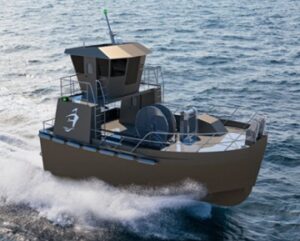
New commercial fishing vessels are needs-tailored
A new compact commercial fishing vessel is meant for general use but designed for conditions of the particular fishery of Bristol Bay, Alaska. Elliott Bay Design Group’s (EBDG) new 32-foot gillnetter is an ultra-shallow, triple-jet boat created for the very shallow waters of Bristol Bay (less than 20-feet); and with the bay’s currents and tides and 32-foot boat length limitation in mind. It can do 20 knots and has a 20,000-pound fish capacity. The model’s design, short, but stocky and hardy in profile, may set it apart from other vessels working in the very active Bristol Bay fishery, which is one of the bright spots of Alaska’s fisheries. >click to read< 17:18
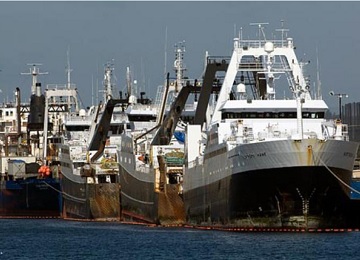
An inside look at Seattle’s fishing industry
This unique network of professionals, ranging from shipbuilders to pipe fitters to marine electricians and more helps fuel the local economy and offers a range of career options. When fishing fleets, based at the Port of Seattle’s Terminal 91 on the Seattle waterfront in Interbay, return laden with their catch, a single ship might carry fillet blocks, loin blocks, surimi, roe, fish meal and fish oil, says Kelli Goodwin, senior manager, Maritime Operations at the Port of Seattle. These products are separated and loaded into export carriers, on-site freezer cold storage, rail cars (for fish oil) or long-haul trucks for domestic distribution. “The next fish stick or fish fillet sandwich you eat, likely was caught by a vessel that calls Seattle home,” >click to read< 14:05
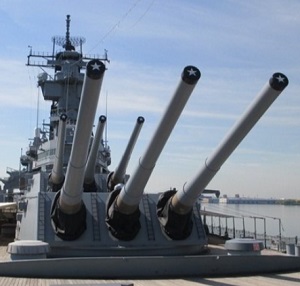
Seafood industry seeks protection from Russian military exercises in U.S. waters
U.S. Coast Guard capability to safeguard national interests and promote economic security in the Arctic will be the subject of a congressional hearing on Dec. 8, one in which Alaska’s commercial fishing entities have a special concern. “From our vantage point, on the front lines of a changing Arctic, a robust U.S. military presence to protect U.S. interests in the region is simply non-negotiable,” said Stephanie Madsen, executive director of At-Sea Processors. The trade association, based in Seattle, represents six member companies who own and operate 15 U.S. flag catcher/processor vessels who harvest Alaska Pollock in the Bering Sea and Aleutian Islands and Pacific whiting in Pacific Northwest coastal waters. >click to read< 08:26

Happy 105th Birthday, Esther ‘Essie’ Lindeman
Born Sept. 15, 1915, Esther “Essie” Lindeman of Grants Pass experienced WWI as an infant, the Spanish flu pandemic when she was 3, reached adolescence during the Roaring ’20s and adulthood during the Great Depression in the 1930s. Most innovations that touch every aspect of our daily lives didn’t exist when Essie was growing up on a dairy farm in upstate New York. Radio was in its infancy, television was in the future, and the Internet and social media were unimaginable. Another interest crept into Essie’s life in the ’30s. A neighboring farm boy she “sorta liked” had left home for a commercial fishing adventure on Bristol Bay in Alaska.,, Happy Birthday, Essie! >click to read< 10:21

91st annual Blessing of the Fleet, Sunday, March 17th, Fishermen’s Terminal, Seattle
The 91st annual Blessing of the Fleet has been scheduled for Sunday, March 17, 2019 at 2:00 pm at the Fishermen’s Memorial site at Fishermen’s Terminal in Seattle, Washington. Originated by the late Pastor O.L. Haavik of Ballard First Lutheran Church 91 years ago, the service will be conducted by Pastor Erik R. Wilson Weiberg and Pastor Elise Scott, both of Ballard First Lutheran Church. We will offer thanks to God for the fishing community, remembering the risks they take each day to provide seafood for our tables. More details, >click to read<17:40
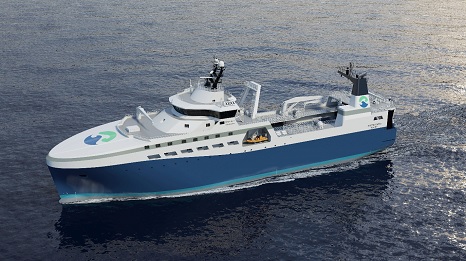
Rolls-Royce Inks it’s Largest Ever Fishing Vessel Contract
Rolls-Royce Marine said it has signed a contract with Thoma-Sea Marine Constructors, L.L.C. in Louisiana for the development of a 100-meter-long trawler to be built for the Seattle based company Arctic Storm Management Group, LLC. In addition to being the largest fishing vessel contract to date for Rolls-Royce with a value of about £15 million, it also marks the first Rolls-Royce fishing vessel concept to be built at a U.S. shipyard. Rolls-Royce has been working closely with the owner, Arctic Storm, in developing this latest design, and the vessel will be equipped with a processing plant for fillet, surimi, fishmeal and fish oil. It will also be able to accommodate a crew of more than 150 people. >click to read<22:19
Ocean polluters seek to have convictions overturned
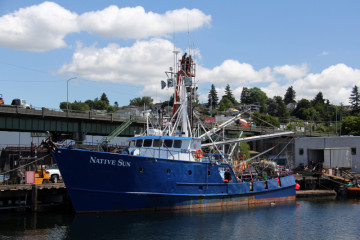 A father-son team that was convicted of polluting Puget Sound and the ocean have asked a judge to toss their convictions. In Seattle federal court on Friday, Bingham Fox asked the judge to throw out his conviction for violating the Clean Water Act. His attorney accused the government of “prosecutorial misconduct.” Fox and his son Randall Fox were convicted of pumping oily bilge water from their 80 fishing vessel “Native Sun.” A deckhand provided the US Coast Guard with a video showing a makeshift pump that pumped engine oil overboard while the vessel was in Blaine harbor. Federal law requires commercial vessels to filter out engine oil and dispose of it properly on shore, which costs time and money. click here to read the story 09:12
A father-son team that was convicted of polluting Puget Sound and the ocean have asked a judge to toss their convictions. In Seattle federal court on Friday, Bingham Fox asked the judge to throw out his conviction for violating the Clean Water Act. His attorney accused the government of “prosecutorial misconduct.” Fox and his son Randall Fox were convicted of pumping oily bilge water from their 80 fishing vessel “Native Sun.” A deckhand provided the US Coast Guard with a video showing a makeshift pump that pumped engine oil overboard while the vessel was in Blaine harbor. Federal law requires commercial vessels to filter out engine oil and dispose of it properly on shore, which costs time and money. click here to read the story 09:12
“Thanks for all the fish” series – Part II – Fishy business – What, you didn’t know this city was built on cod?
 At the beginning of the 20th Century, Seattle’s economy was based on natural resources and the processing of them. Timber from the region’s vast forests was turned into lumber. Wheat and produce were milled and canned for consumption elsewhere. Coal from places with names like Black Diamond fueled industry and was exported to other areas. Fish from Alaska was processed in the canneries that lined the waterfront. more@crosscut Part1: Thanks for all the fish 10:23
At the beginning of the 20th Century, Seattle’s economy was based on natural resources and the processing of them. Timber from the region’s vast forests was turned into lumber. Wheat and produce were milled and canned for consumption elsewhere. Coal from places with names like Black Diamond fueled industry and was exported to other areas. Fish from Alaska was processed in the canneries that lined the waterfront. more@crosscut Part1: Thanks for all the fish 10:23
Like a Fish Needs a Bicycle or, When Some Schmuck Moves From New York to Seattle!
Those of us who have grow n up in the Puget Sound region are deeply committed to the fishing industry, and appreciate that Seattle, as the homeport of the North Pacific fishing fleet, continued@fishermensnews
n up in the Puget Sound region are deeply committed to the fishing industry, and appreciate that Seattle, as the homeport of the North Pacific fishing fleet, continued@fishermensnews



































